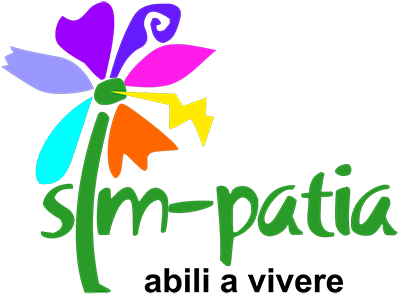SIM-PATIA (1999-2024) - 25 YEARS OF ACTIVITY AND LESSONS
In 1989, a group of friends decided to take action to establish a place of residence for adult individuals afflicted by severe disabilities. That's when Sim-patia started, which, after adapting the project's goals to the regional regulatory framework, began operating in 1999.
This year, then, marks 25 years of Sim-patia's activity. Many services in favor of individuals deprived of their autonomy have come to life with a significant impact not only on the territory but, we think, also on the culture and the way of understanding and promoting care and services for the disabled.
In the past 25 years we have learned a great deal and would like to take this opportunity for you to be a part of it.
The first lesson is that as soon as the idea is focused and the group of willing people is consolidated, one must start.
At the risk of getting off on the wrong foot, the very act of starting gives substance to the idea and pushes one to confront reality.
The founders, in fact, purchased the “Sympathy” property thanks to fundraising promoted by the newspaper La Provincia. I had not yet returned from Rome,
where I was living with my family and where my son had suffered a very serious and fatal accident to his autonomy.
Upon returning to Como, the group of Sim-patia's founders urged me to be part of the initiative. I resisted because I was still confused and deeply
troubled by what had happened, but I soon realized that if I could assure my son the care and assistance he needed in our home, most situations
similar to the one that happened to our family would have witnessed not only great pain but also all the consequences of a lack of equipped spaces
and the basic and specialized assistance needed to cope appropriately with such happenings.
How many imploded or fragmented or torn families we have encountered in this quarter century. I therefore joined and began to be part of the group.
The second lesson that we have treasured and have always kept as an indispensable course is that an initiative dealing with such a sensitive issue as a severe disability must necessarily cooperate with the Public Sector to ensure continuity, resources, and safety. We did this from the very beginning when the project was adapted to what the Lombardy Region's Socio-Health Plan provided and, as a result, was able to take advantage of the resources essential for the implementation of the first nucleus and the start of activities with the Region's accreditation.
In addition, to offer quality services, one must have quality operators. But first, it is essential to have a vision of what you want to propose. Sim-patia residents desire “autonomy” and know that they will have to find in residual skills the space they can regain. Our claim, under the Sim-patia logo is “able to live” as opposed to the word disabled, is their ambition and their goal. Everyone at Sim-patia, operators and managers, knows that this is the mission and that you have to live it with intensity and passion. It makes a big difference when you walk into an organization that is clear about its mission. You can sense it right away. Every guest is different; their needs and expectations are different. You start from there and build the response. But this is only possible if everyone is aware that this is the only path.
Another lesson. It might not happen the first time, but it is essential to meet the right people. And this luck, or this attraction, Sim-patia had it, with Irma Missaglia, who has now, after 20 years of directing Sim-patia, succeeded me as president. Creativity, empathy, charm, ability, and taste for important challenges. At this point, I leave it to her to describe what she has learned in these fruitful years.
I tiptoed into Sim-patia in 2002, knowing that beyond running a health care residence, the people who lived there with all the limitations of an interrupted life, by listening to them, would show me the right choices to achieve a better quality of life.
The first thing I learned is the value of life that everyone expresses in various ways: they live intensely even the scraps of life that fate has left behind. From them, I learned what resilience is: this strength and ability to grasp and cling to any physical, cognitive, and technological help in order to face and overcome their difficult lives. They teach me to enact a challenge every day to overcome limitations and difficulties.
When life presents you with such a high bill as losing parts of your body, your job, and sometimes even your family and friends, people ask you not to extinguish the hope of putting residual abilities back into play to regain every possible autonomy. They have taught me to see each of them as an individual person, to care for them every day in whatever services they are placed in, in the care pathways that Sim-patia has developed over the years so that each of them can be well and feel truly “able to live.”
A concrete message was delivered to me by a person who, at the conclusion of her journey from Sim-patia to resume her autonomous life, encapsulates all the meaning and lessons experienced by all those at Sim-patia who work to ensure that its mission continues today and in the future:
“Thank you for giving me back my dignity; autonomy is freedom.”
Twenty-five precious years, then, on which to continue building Sim-patia's future. With feet on the ground and a wide gaze.
With gratitude!
Gerolamo Saibene, Honorary President
Irma Missaglia, President


 - 25 ANNI DI ATTIVITÀ E DI INSEGNAMENTI - Sim-patia_files/116.png)